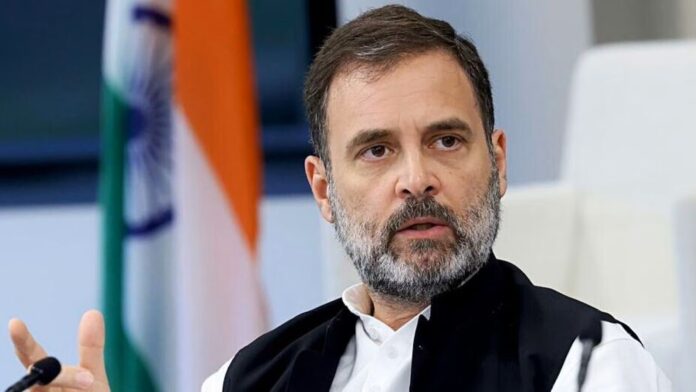Ahead of Maharashtra Assembly Elections, Rahul Gandhi Criticizes BJP’s Ideology Following Shivaji Maharaj Statue Collapse
Congress leader Rahul Gandhi took a sharp jab at the Bharatiya Janata Party (BJP) during a public meeting in Kolhapur on Saturday, following the collapse of a statue of Chhatrapati Shivaji Maharaj in Malvan, Sindhudurg district. Gandhi tied the incident to a broader ideological critique of the BJP, arguing that the party’s approach fundamentally misrepresents and undermines the values Shivaji Maharaj stood for.
Addressing the crowd before unveiling another statue of the legendary Maratha king, Rahul Gandhi emphasized that the Congress party is fighting against the same ideology that Chhatrapati Shivaji Maharaj once resisted. He stated, “They (the BJP) made a statue of Shivaji Maharaj, and after a few days, the statue broke and fell down. Their intention was wrong, and the statue gave them a message—if you want to make a statue of Shivaji Maharaj, you must protect the ideology of Shivaji Maharaj. That is why the statue fell down, because their ideology is wrong.”
Rahul Gandhi’s remarks referred to the collapse of a statue of Chhatrapati Shivaji Maharaj, which had been unveiled just nine months earlier by Prime Minister Narendra Modi at Rajkot Fort in Malvan. The statue’s fall on August 26 sparked widespread outrage and became a symbol of political failure for the opposition. Many critics, including Gandhi, saw it as emblematic of the BJP’s failure to honor Shivaji Maharaj’s legacy.
The Congress leader argued that Shivaji Maharaj’s thoughts and principles are inherently connected to India’s Constitution. He contended that Shivaji Maharaj’s vision of an inclusive and just society laid the groundwork for the values enshrined in the Constitution. “Shivaji Maharaj had said that the country belongs to everyone. We have to move ahead by taking everyone along, ensuring no injustice,” Rahul Gandhi said. He continued by stating that the Constitution itself would not exist without the contributions of great leaders like Shivaji Maharaj and Shahuji Maharaj, who championed equality and unity during their reigns.
Rahul Gandhi also linked the collapse of Shivaji Maharaj’s statue to a broader ideological struggle in the country. He framed this as a battle between two competing visions for India. According to Rahul Gandhi, one ideology—represented by the Congress and its allies—seeks to protect the Constitution, promote equality, and foster unity, which he described as “Shivaji Maharaj’s ideology.” The other, associated with the BJP, he claimed, aims to erode the principles that underpin India’s democratic institutions.
“This is not just a political fight; this is a fight of ideology,” he remarked, referring to the BJP’s governance and handling of the situation. Gandhi’s criticism extended beyond the statue incident, as he highlighted the exclusion of Droupadi Murmu, India’s first tribal President, from key national events, such as the inauguration of the new Parliament building and the Ram Mandir in Ayodhya. He suggested that these exclusions reflected a deeper problem within the BJP’s governance approach, which he believes is disconnected from the inclusive principles that figures like Shivaji Maharaj espoused.

Prime Minister Modi had earlier apologized for the collapse of the statue on August 30, acknowledging the reverence Chhatrapati Shivaji Maharaj holds for him and many Indians. In his public apology, Modi expressed deep regret, stating, “Chhatrapati Shivaji Maharaj is not just a name for me, for us, Chhatrapati Shivaji Maharaj is our idol. Whatever happened in Sindhudurg a few days ago…today, I bow and place my head at the feet of my beloved god Chhatrapati Shivaji Maharaj and apologize.”
Despite this apology, the issue has provided ammunition for the opposition ahead of the upcoming Maharashtra assembly elections, slated to take place later this year. While the Election Commission of India has not officially announced the dates, the political climate in the state is heating up, with both alliances—the Maha Vikas Aghadi (MVA) and the Maha Yuti—preparing for a high-stakes battle.
The Maha Vikas Aghadi, which consists of the Shiv Sena (UBT faction), the Nationalist Congress Party (NCP Sharad Pawar faction), and Congress, is positioning itself as the protector of Maharashtra’s legacy and values. The alliance has made it clear that it intends to challenge the BJP and the breakaway factions led by Eknath Shinde and Ajit Pawar over issues such as the Maratha reservation and the state’s cultural heritage.
On the other side, the Maha Yuti alliance—comprising the BJP, Shiv Sena (Eknath Shinde faction), and NCP (Ajit Pawar faction)—is confident in its ability to maintain power. The BJP has repeatedly emphasized its development initiatives and governance achievements. However, the collapse of Shivaji Maharaj’s statue, coupled with ongoing social tensions, poses a challenge to the ruling alliance’s narrative.

Rahul Gandhi’s speech underscored the symbolic importance of Chhatrapati Shivaji Maharaj in Maharashtra’s politics, where the Maratha king is revered as a unifying figure who stood for justice, equality, and self-rule. By connecting the collapse of Shivaji’s statue to the ideological contest between the Congress and the BJP, Rahul Gandhi aims to galvanize support for the Congress-led MVA, painting the election as not just a political contest but a fight for the soul of Maharashtra.
The Maharashtra Assembly, with its 288 seats, is pivotal in shaping the state’s future political landscape. As the elections draw nearer, the legacy of Shivaji Maharaj and his relevance to contemporary politics will likely remain a central issue. Rahul Gandhi’s invocation of Shivaji Maharaj’s ideals of equality and justice resonates deeply in a state where the Maratha legacy is intertwined with the political consciousness of the people.
As the countdown to the assembly elections begins, both alliances will continue to compete for the public’s attention, with the legacy of Shivaji Maharaj serving as a focal point in the contest between competing visions for Maharashtra’s future.


